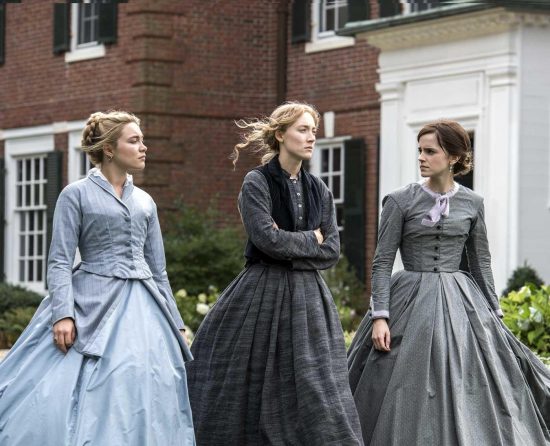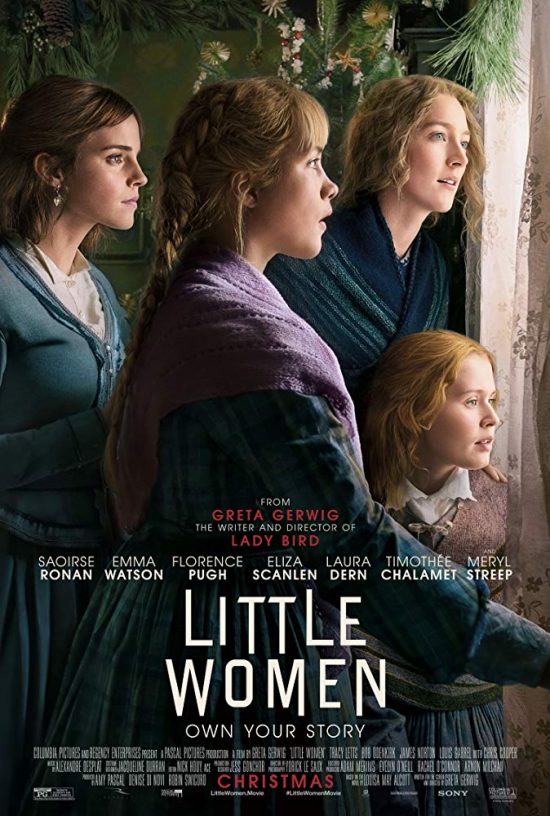Review: Little Women – “A stunning portrayal of how women live and love”
“I’ve been angry every day of my life” states Laura Dern’s Marmee, in a brief moment of candidness, midway through the newest adaptation of Little Women – in the first of many tear-soaked scenes from Greta Gerwig’s Tour de Force. However, this latest adaptation of Louisa May Alcott’s beloved book cleverly builds on its cinematic predecessor, focusing a little on anger, a little on desire and a lot on pure joy.
Right, let’s back up. What is Little Women about? Commonly considered an old-fashioned romantic story, in a recent interview with Vanity Fair, Gerwig said she intended her version to be less a tale of Girl-gets-Boy and more a tale of Girl-gets-Book.
Little Women is the story of the four March sisters – Jo (Saoirise Ronan), Meg (Emma Watson), Beth (Eliza Scanlen) and Amy (Florence Pugh), navigating personal journeys through adolescence in a small New England town during the American Civil War. The March family retain a certain status, if not money, mother Marmee having married for love to a man who is off helping the war effort (played by Bob Odenkirk, great but, understandably, largely absent), while his elder sister Aunt March (Meryl Streep) controls the family purse strings. The March family get their kicks from co-mingling with next door neighbour Mr Lawrence (Chris Cooper) and his grandson Laurie (Timothee Chalamet), however, as the title suggests, Little Women’s primary purpose is to weave a story of the four daughter’s ambitions: Jo wants to be a writer, Meg wants a family, Beth lives for music and Amy wants to become a ‘great’ artist or perish trying. The film’s second purpose is to illustrate the difficulties in making the choice to ‘do good’ over ‘getting what you want’, shown through amusing interplay between four very different leads, all struggling with a society not designed to meet their needs.
From the off, the film flips the established narrative, splitting the book’s story into a to and fro between two periods, seven years apart. It’s one of many clever changes to the original story that activates the audience. Another touch is allowing each character to breathe, from showing Meg’s acting pursuits and fondness for fabric, through Amy’s accomplished painting (so detailed that she can’t nail impressionism) to Beth’s exquisite piano forte and desire to hear music more than interact with people (#didAlcottinventintroversion?). Gerwig gives the introverted Beth plenty of screen time, allowing Scanlen – known for her brilliant portrayal of a teen psychopath in Sharp Objects – to wring emotion from her scenes.
Watson’s Meg is perhaps the most superfluous, one of the film’s few criticisms being that Meg occasionally veers into one-note territory, perhaps a casualty of re-centring focus on Beth’s tragic story. That’s not to say that Watson isn’t good, it’s a nice, understated role.
Ronan is perfectly suited to playing the androgynous Jo, and she is the heart of the movie, but somehow not the most interesting part of it. That distinction belongs to Pugh, by far the star of Little Women, required to play an immature teen through to 20, with a lightness of voice and movement that endear the viewer to a character who can be spoiled and mean.
Chalamet is an adequate Laurie, and he always plays well against Ronan, however, all of the male actors are rightfully unshowy, enabling the women to enjoy the limelight. Gerwig has capitalised on what she learned making Lady Bird and always draws that narrative back to her central theme – female emancipation. Even Streep is used sparingly, yet her, Cooper and a nice turn from Tracy Letts spread joy whenever they appear.
Gerwig’s larger budget is well-spent, she plays with camera, using reflection and movement, effortlessly moving the story from a New York boarding house to a French chateau, assisted by a fantastic score from Andre Desplat. And the director gives the movie a bold ending, not changing it as such, but refocusing the story around the girl getting the book, almost chastising the viewer for coveting more romance. Gerwig only half-succeeds making this point, as this story is clearly about love in its many forms, she particularly captures the trials and tribulations of familial love so well.
Yes, Little Women is an intrepid character-study and a welcome addition to the social discourse, that should appeal to anyone, but there is no shame in highlighting the elephant in the room. This is a simply stunning portrayal of how women live and love.
Little Women is in UK cinemas on 26th December 2019.











